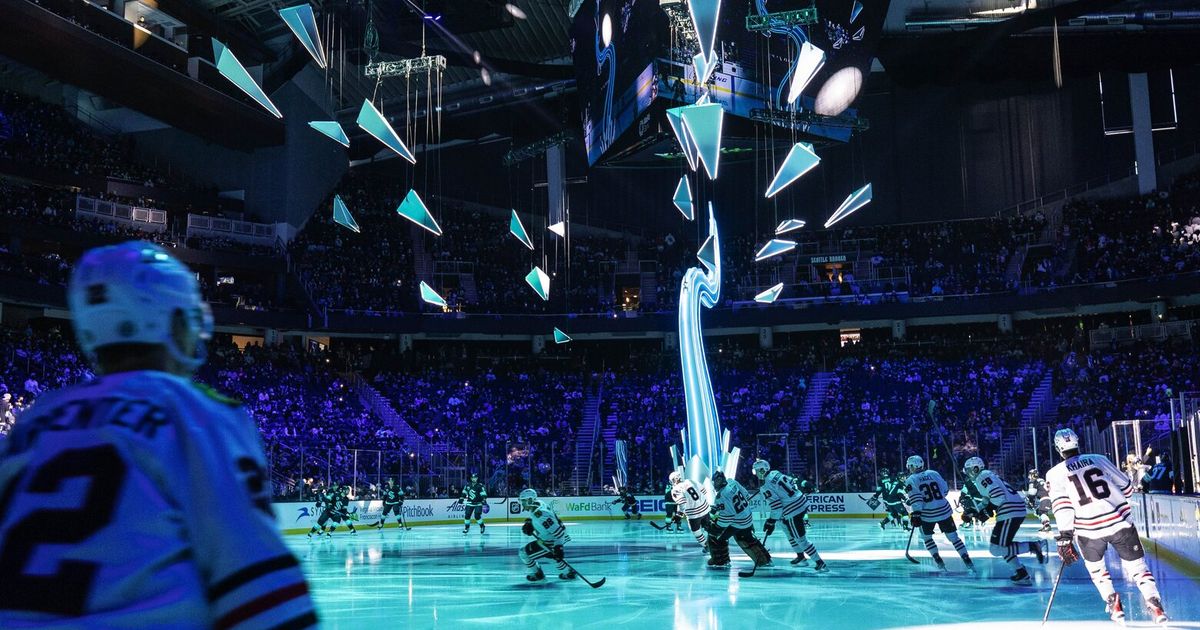
Donny Stevenson remembers growing up a die-hard fan of Seattle sports teams and even cheering for the Vancouver Canucks as an NHL franchise before the Kraken came about.
But Stevenson, 44, vice-chairman of the Muckleshoot Indian Tribe, also often saw Native Americans depicted as two-dimensional characters by various teams through their names and mascots. He felt that experience carried a “dehumanizing perspective” for him and was “harmful to our young people” because it compartmentalized natives as two-dimensional people with backward, violent tendencies.
That’s the biggest reason Stevenson is elated about a groundbreaking, multiyear partnership with the Kraken, announced Wednesday, in which Muckleshoot becomes the first Indian tribe to sponsor a jersey patch for a major professional sports team. The Muckleshoot tribal logo will be placed on the right chest of Kraken home and away jerseys starting next season, showcased to millions of fans on team platforms and television broadcasts.
“There are so many eyes that have the opportunity to see this sort of specific engagement,” Stevenson said. “And that asserts our identity as something that’s thriving, living, a part of the culture of the city and the region. It’s hard to imagine another way to be able to do it on this scale.”
And it also gives young sports fans within Muckleshoot and other Native American tribes something to latch on to beyond seeing themselves stereotypically depicted as axe-wielding, arrow-shooting war mongers.
“Anything we can do to help educate people in our region and nationally about who we are, what matters to us, the values we reflect in our teachings and traditions, is fundamentally and vitally important to us as leaders,” Stevenson said, adding: “Just the amount of pure, overwhelming exposure and eyes on a patch within the professional sport of hockey really pushes that agenda and helps us accomplish those goals in a way that is real and tangible.”
The Muckleshoot Casino was among the Kraken’s very first sponsors, hammering out the partnership in summer 2019 when the expansion squad was still known as NHL Seattle and announcing a deal in October of that year. The casino has signage throughout Climate Pledge Arena and the “Muckleshoot Casino Power Play” also gets announced over the public address system whenever the Kraken begin a man advantage.
But the jersey deal moved beyond just the casino into the tribal realm. Stevenson said he feels attaching the Muckleshoot name to the casino has led to misunderstandings within the broader Washington community about the tribe’s values and priorities.
He hopes the new deal can rectify some of that.
Kraken representatives had been discussing a jersey deal since the NHL announced in August 2021 that such sponsorships would be allowed starting this season. The NBA began allowing ad patches on jerseys starting in 2017-18 — generating more than $150 million in added revenue — and getting the NHL to seriously consider going a similar route.
But the Kraken said they wanted their patch to do more than simply attract corporate dollars. Much like getting Amazon to attach its “Climate Pledge” initiative to the team’s arena after buying the naming rights, the Kraken envisioned a jersey deal that could broaden its community efforts.
Several weeks back, Kraken officials visited the Muckleshoot Tribal Council for a formal presentation of what the deal would entail and mock-ups of some patch design ideas.
“It was a very emotional meeting,” Kraken CEO Tod Leiweke said. “We told them how much this deal meant to us because of everything it represented. And they were very emotional telling us how much this means to them.”
As part of the deal, additional artwork will be created at Climate Pledge to celebrate Indigenous people. A multisport court will be built on the Muckleshoot Reservation in partnership with the tribe and the Kraken have also committed to creating programs for Indigenous youth.
Mari Horita, executive director of the One Roof Foundation — the charity arm of the team and Climate Pledge Arena — said the deal works because both the Kraken and Muckleshoot have common goals of sustainability and community empowerment. Horita mentioned the NHL dealing with a longstanding issue of hockey being shut off from communities not traditionally represented within the sport.
“What we’ve been committed to from the start is building the most diverse and welcoming and representative team and culture in the country,” Horita said. “What better way to communicate to the world that ‘No, you are a part of this team. You are represented here. You belong here.’
“There’s no stronger way to say ‘Absolutely, you belong here.’ And not just to the Muckleshoot Tribe but to the entire Indigenous community and frankly, it’s to all non-represented, minority communities who feel ‘Maybe there isn’t a place for me here.’ So, that’s very significant to us as well.’
Stevenson said the fact it’s the tribe’s logo on the jersey and not the casino’s says plenty about the meaning of the deal going beyond corporate dollars. He hopes the “organic relationship” between the team and tribe can serve as “a model for all of pro sports” about how such sponsorships can help community betterment.
“Athleticism has always been a part of our culture and our tradition here on the reservation,” Stevenson said. “You’ll see tournaments that take place between our basketball teams, our baseball teams, softball squads. So, that’s a real part of our community.
“So, to be able to engage on the highest level like this is something that’s really meaningful to us. It represents a lot of growth and opportunity that’s taken place over the last generation.”